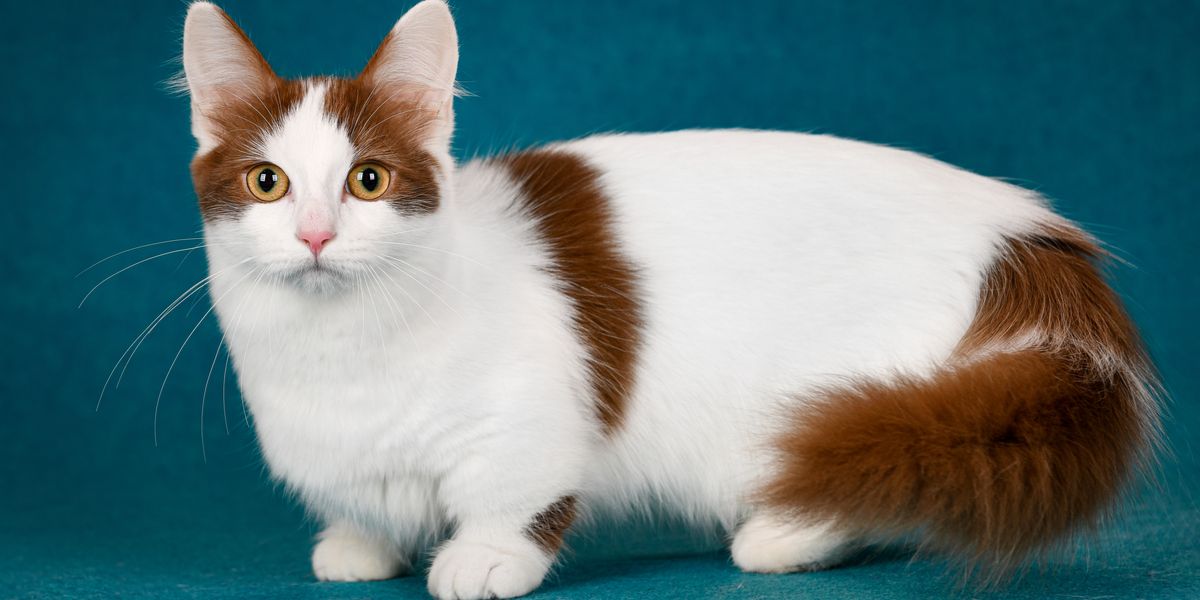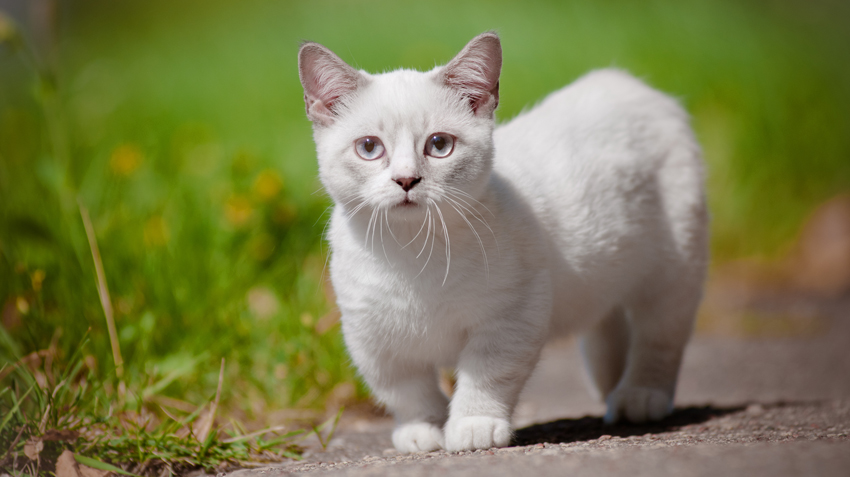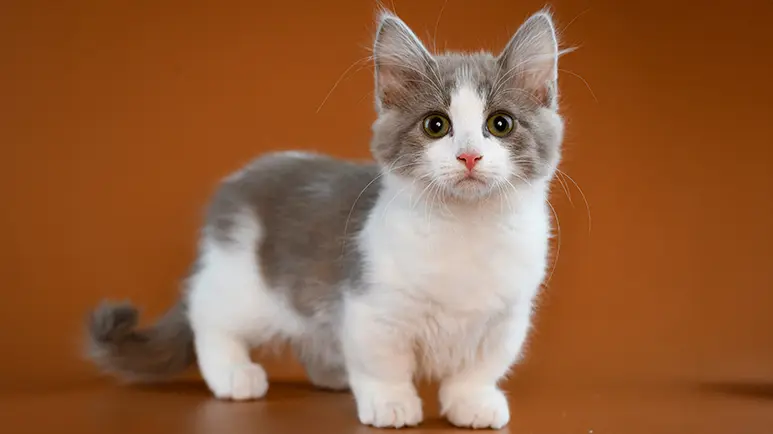Ever wondered why some cats seem to glide across the floor with their little legs? If you’ve been curious about these adorable short-legged felines, you’re in for a treat.
You’re about to discover the charming world of cats with tiny legs, and how these unique creatures have captured the hearts of many pet lovers. Whether you’re considering adopting one or simply fascinated by their distinct appearance, this article will unravel the mystery behind these pint-sized companions.
Get ready to uncover what makes these breeds so special and irresistible. Keep reading to find out which breed might be the perfect addition to your home.

Credit: www.reddit.com
Origins Of Munchkin Cats
Munchkin cats are known for their short legs, a result of a genetic mutation. This unique trait gives them a distinct appearance, similar to dachshund dogs. Originating in the 1980s, they quickly gained popularity for their playful nature and charming looks.
The Munchkin cat is a unique breed known for its short legs, a trait that has captured the hearts of cat enthusiasts worldwide. These adorable felines have a fascinating origin story that dates back to the early 1980s. Understanding their beginnings helps us appreciate their distinctive appearance and charming personality.Understanding The Genetic Mutation
Munchkin cats owe their short legs to a natural genetic mutation. This mutation affects the development of their leg bones, resulting in shorter limbs. Unlike other dwarfism conditions, it doesn’t impact their overall health or agility. You might wonder if this trait is a disadvantage. Surprisingly, Munchkins are just as playful and energetic as their long-legged counterparts. They can run, jump, and play with the best of them, proving that their size doesn’t limit their spirit.The Role Of Sandra Hochenedel
In 1983, a school teacher named Sandra Hochenedel discovered two pregnant cats hiding under her car in Louisiana. One of these cats gave birth to a litter that included kittens with unusually short legs. Sandra was intrigued by these kittens and decided to keep one, naming her Blackberry. Blackberry later became the foundation for the Munchkin breed, passing on her unique trait to future generations. Have you ever thought about how a chance encounter can shape the future of an entire breed? Blackberry’s story is a testament to the unexpected ways nature works its magic.Recognition And Acceptance
The journey to recognition for Munchkin cats was not straightforward. Critics expressed concerns about the health implications of their genetic mutation. However, breeders and enthusiasts advocated for their acceptance, emphasizing their health and vitality. In 1994, the International Cat Association (TICA) officially recognized the Munchkin breed. This milestone marked a significant step in legitimizing their place in the feline world. Do you think the charm of Munchkin cats will continue to win over skeptics? Their growing popularity suggests that their appeal is here to stay.Popularity And Cultural Impact
The Munchkin’s unique appearance and playful nature have made them a favorite among cat lovers. They have appeared in various media, from viral internet videos to television shows, capturing the public’s imagination. Their rise in popularity raises an interesting question: What makes a pet truly captivating? For many, it’s the combination of an unusual look and an irresistible personality, and Munchkins have both in abundance. As you consider adding a Munchkin to your family, remember their origins. Their story is one of resilience and charm, a testament to the beauty of diversity in the animal kingdom.Unique Physical Traits
Cats with short legs captivate many pet lovers. Their unique appearance and charming demeanor make them stand out. These breeds are not only adorable but also have fascinating traits.
Short Legs Explained
Short-legged cats belong to the dwarfism category. Munchkin is the most well-known breed. Their short legs result from a natural genetic mutation. This mutation affects the long bones in their legs. Despite their stature, these cats are agile. They run and play like other cats. Their body proportions remain balanced. This makes them both cute and functional.
Coat Colors And Patterns
Short-legged cats come in many colors and patterns. Munchkins can have solid, tabby, or even calico coats. Each cat is unique with its own color scheme. This diversity adds to their appeal. Some have striking eyes that match their coat. Others have distinct markings or patches. These traits make them highly desirable among cat enthusiasts.
Personality And Temperament
Breeds like the Munchkin cat are known for their short legs, adding a unique touch to their appearance. These cats often display a playful and curious temperament, enjoying active interaction and exploration. Their distinct personality makes them a charming companion for families and cat enthusiasts alike.
When it comes to the intriguing world of feline companions, short-legged cats like the Munchkin breed have captured the hearts of many. Their distinct appearance is just the beginning; their personality and temperament are equally captivating. If you are considering bringing a short-legged cat into your home, understanding their behavior and traits can help you make a more informed decision.Playfulness And Activity
Short-legged cats are brimming with energy. Despite their small stature, they are incredibly playful. You might find them darting across the room in pursuit of a toy or playfully batting at imaginary creatures. Their shorter legs give them a unique way of interacting with their environment. They are agile and can navigate small spaces with ease. This trait makes them great at playing hide-and-seek. Have you ever seen a cat hop like a bunny? Short-legged cats often do. This endearing quirk adds a layer of charm to their playfulness. Their antics provide endless entertainment.Social Interactions
Short-legged cats are known for their sociable nature. They love being around people and other pets. If you have a busy household, they will thrive in such an environment. Their affectionate nature means they often seek attention. Don’t be surprised if you find your furry friend curling up on your lap. They enjoy being part of family activities. These cats are also quite vocal. They express themselves through a variety of sounds. Listening to their chirps and purrs can be quite delightful. Have you ever wondered if a cat could be loyal like a dog? With short-legged cats, this might just be possible. They form strong bonds with their owners, making them a cherished addition to any home. Would you consider a short-legged cat for your next pet? Their unique personality and temperament make them a fascinating choice. Understanding these traits can help you ensure a harmonious relationship with your new feline friend.
Credit: cats.com
Health Considerations
Cats with short legs captivate many with their unique appearance. Yet, their charm comes with specific health considerations. Due to their physical traits, these breeds might face certain health challenges. Understanding these issues can help ensure a happy, healthy life for your feline friend.
Common Health Issues
Short-legged cats often face joint problems. Their legs bear more stress, leading to discomfort. Arthritis can become a concern as they age. Breathing difficulties might occur due to body structure. Some breeds are prone to spinal issues. Regular check-ups are essential to catch problems early. Monitoring your cat’s movement is important for their well-being.
Care Tips
Provide a balanced diet to support joint health. Supplements can aid their bone strength. Offer toys that encourage gentle play. Avoid activities that strain their legs. Ensure they have easy access to litter boxes. Keep surfaces soft where they often rest. Regular vet visits are crucial for early issue detection. Observing their behavior helps identify discomfort.
Living With Munchkin Cats
Munchkin cats are known for their adorable short legs and lively personalities. Living with these unique felines is a joy, but it comes with its own set of considerations. You’ll find that Munchkins bring a special charm to your home, making each day a little brighter with their playful antics and affectionate nature.
Ideal Home Environment
Munchkin cats thrive in homes where they have plenty of space to roam and explore, despite their short legs. They love to climb and play, so consider adding cat trees or shelves at lower heights for easy access. If you have other pets, Munchkins usually get along well, but make sure each animal has its own space to retreat to.
Think about your living space. Is it safe and free from hazards? Munchkins are curious, and their low stature can lead them into places other cats might not venture. Ensure cables are tucked away and any small spaces are inaccessible to avoid mishaps.
Training And Socialization
Training a Munchkin cat can be both rewarding and fun. Use positive reinforcement to encourage good behavior. Treats, praise, and playtime work wonders. Munchkins are intelligent and can learn commands and tricks with patience.
Socialization is crucial. Introduce your Munchkin to different people and environments early on. This helps them become confident and less fearful of new experiences. You can schedule regular playdates or short trips to ensure they are comfortable around strangers and other pets.
Are you ready to engage with your Munchkin in a meaningful way? Teaching them to fetch or solve simple puzzles can enrich their life and yours. It’s about building a strong bond that makes living with them all the more delightful.
Living with a Munchkin cat is an adventure filled with joy and unique challenges. Embrace their quirks and create a home environment that caters to their needs. Your efforts will be rewarded with a loyal and loving companion who brightens your days.
Munchkin Cats In Pop Culture
Munchkin cats, known for their short legs and playful personalities, have captured the hearts of many. These unique felines have made their way into pop culture, gaining fame and recognition far beyond cat shows. Whether it’s through movies, internet memes, or celebrity endorsements, Munchkin cats have left a significant mark. Let’s dive into their journey through the world of entertainment.
Famous Munchkins
Some Munchkin cats have achieved almost celebrity status. Take Lilieput, for instance, who holds the Guinness World Record for the shortest cat. This adorable feline has garnered a massive following, proving that small stature can lead to big fame.
Another well-known Munchkin is Blackberry, whose unique look helped bring attention to the breed. These cats have charmed their way into the spotlight, showing that their short legs don’t limit their appeal.
Media Appearances
Munchkin cats have often been featured in movies and TV shows. Their distinct appearance and playful nature make them perfect for the screen. They’ve appeared in popular shows, stealing scenes with their cuteness.
Even in commercials, Munchkin cats have been used to grab viewers’ attention. Their quirky looks make them memorable and relatable, leaving a lasting impression on audiences.
Have you ever noticed a Munchkin cat in your favorite show? Their presence is a testament to their growing popularity. This rise in media appearances reflects their unique charm, resonating with audiences worldwide.
What makes these cats so captivating in the media? Could it be their playful antics or their heartwarming appearance? These questions highlight their intriguing role in pop culture.
Next time you spot a Munchkin on screen, remember their journey from a unique breed to a pop culture icon. Their story is a testament to the power of individuality and charm.

Credit: www.petinsurance.com
Frequently Asked Questions
How Much Do Munchkin Cats Cost?
Munchkin cats typically cost between $500 and $3,000, depending on their pedigree and breeder reputation. Prices vary by location, breeder experience, and cat characteristics. Always choose reputable breeders to ensure health and quality.
Do Munchkin Cats Have Any Health Issues?
Munchkin cats can face health issues like lordosis and pectus excavatum. They may also develop joint problems. Regular vet check-ups are crucial to monitor their health. Proper care and a balanced diet help maintain their well-being.
Why Do Some Cats Have Such Short Legs?
Some cats have short legs due to genetic mutations. Breeds like Munchkin are known for their distinct short legs. This trait does not typically affect their health, allowing them to move and play normally. Short-legged cats are often adored for their unique appearance and playful nature.
Why Does My Cat Have Short Legs But Not A Munchkin?
Your cat might have short legs due to a genetic mutation, not exclusive to Munchkin cats. Some breeds naturally have shorter legs. It’s possible for mixed-breed cats to inherit this trait. Consult a vet or genetic test for confirmation.
Conclusion
Short-legged cats are truly unique and adorable. Breeds like the Munchkin charm with their playful nature. These cats bring joy and companionship to any home. Their small stature doesn’t limit their big personalities. They love to explore and engage with their surroundings.
Perfect for families or singles seeking a lively pet. Always ensure proper care and attention for these special breeds. Regular vet visits and balanced diets keep them healthy. Consider adopting a short-legged cat for endless fun. Their loyalty and affection make them wonderful companions.
Embrace their uniqueness and enjoy their company every day.
